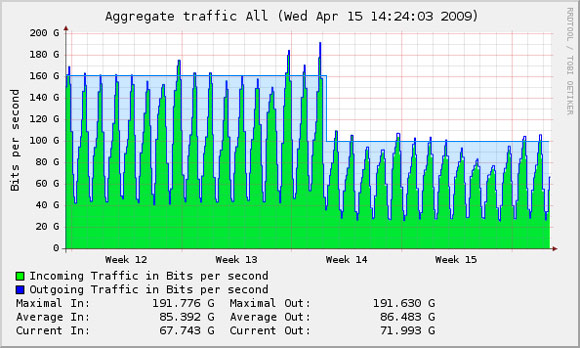 Today it’s been two weeks since Sweden enacted the IPRED law that makes it much easier for industry organizations to prosecute individuals involved in illegal file sharing and piracy. So at Pingdom we decided to examine the effects so far, looking at broadband traffic and online sales.
Today it’s been two weeks since Sweden enacted the IPRED law that makes it much easier for industry organizations to prosecute individuals involved in illegal file sharing and piracy. So at Pingdom we decided to examine the effects so far, looking at broadband traffic and online sales.
Still much less traffic
Right after the law came into force on April 1st, the Swedish national broadband traffic dropped dramatically from an average of 160 Gbit/s to about 100 Gbit/s. If this is due to a reduction in illegal file sharing is disputed, but no other credible explanations have been offered for this event.
Researchers, file sharing representatives and others have contended that this is likely only to be a temporary effect. In Finland, for example, broadband traffic also dropped after the implementation of the EU Ipred directive into national law, but today file sharing is back up and more common than ever.

Above: Traffic data from the Swedish IXP Netnod. Note the significant traffic drop on April 1.
Well in Sweden so far, the national broadband traffic levels through the Internet Exchange Points have failed to increase, they lie steadily at about 100 Gbit/s. Unfortunately international traffic data are not so easy to come by, and we can’t determine if Swedish cross-border traffic has been affected.
But increased online sales
Interestingly, however, legal gaming and music downloading sites report increases between 20 and 100 percent during April, and so do the video on demand sites. Pingdom asked Sweden’s biggest video on demand service, SF Anytime about their sales:
“Our sales have increased steadily since the first of April. However this coincides with a number of campaigns on our part and so it is quite impossible to determine the cause of the sales increase just yet,” says Magnus Aurell, Marketing Manager at SF Anytime. Asked whether he believes SF Anytime will benefit from the IPRED legislation, he adds:
“Absolutely, we do hope the law will have a positive effect for us.”
Trends still uncertain
 While many parts of the industry may have a vested interest in portraying the law as a success, others still see the future as uncertain. Asked by Pingdom about the future, Daniel Westman, a researcher in Law and Information Technology at Stockholm University says:
While many parts of the industry may have a vested interest in portraying the law as a success, others still see the future as uncertain. Asked by Pingdom about the future, Daniel Westman, a researcher in Law and Information Technology at Stockholm University says:
“This is just a temporary drop, similar to phenomena during industry initiatives with a lot of media coverage before. There will have to be convictions in the courts for a lasting drop in file sharing, and even then many file sharers are likely to migrate to technologies where evidence is very difficult to get.”
VPN file sharing coming soon
So the story has at least two endings. Either the legal media download sites improve and offer good enough terms for most of the consumers to choose this path, or considerably large parts of the internet traffic will become untraceable as consumers start using more powerful solutions to mask file sharing activities.
The large Swedish BitTorrent tracker The Pirate Bay has already received 113 000 requests for a beta invite to its new VPN-service IPREDator, due to launch soon. The VPN-service will hide the origins of its users making it hard for the anti-piracy organizations to trace copyright violators.
Regardless of all else, file sharing technology will continue to evolve rapidly. We just have to hope that the legal alternatives will develop faster, offering bigger, better and more affordable services that are more attractive.
What do you think will happen? What do you think should happen?
Sources: Swedish IXP Netnod, SvD – Internet traffic dropped, IDG – A rush to Gamers Gate after the IPRED-law, Aftonbladet – Pirated copies out of fashion after IPRED-law, SF Anytime, Stockholm University – IRI, DN – Pirate Bay hides 100 000 file sharers.



























